It was hard narrowing down that previous list of my absolutely favorite books of 2022. Just ten? You’ve got to be kidding me!
Most of these awarded below could have easily been on that list. They are wonderfully written, offering rigorous ideas; they beautifully teach and vividly entertain. Overtly Christian or not, read with discernment, they are edifying. Here, then, is the second portion of our three-part awards show.
Don’t forget to scroll the whole way down to see the last few. Use the order form link at the bottom, please. All are 20% off.
And the envelope please…
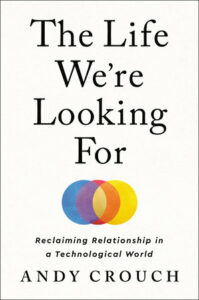 The Life We’re Looking For: Reclaiming Relationship in a Technological World Andy Crouch (Convergent) $25.00 OUR SALE PRICE = $20.00
The Life We’re Looking For: Reclaiming Relationship in a Technological World Andy Crouch (Convergent) $25.00 OUR SALE PRICE = $20.00
Sometimes at awards shows, the same film or director gets brought to the stage for yet another award. I want to once again honor this one, one I named in my “Top Ten” list last week. It’s’ just that good.
From the moment I started this book I was captivated, brought in, glad for how wonderfully written and wise and interesting it was. Andy would not want us to overstate his genius and he’s critical of a world that created that kind of hubris. In fact, in this book, he explores the history of the notions of magic, alchemy, and — in modern times — manipulation through new forms of technology and mass media. He knows all this, and (is self aware enough to know that he flirts himself with it all) is inviting us to consider not only our technological environment (with some astute cultural criticism) but inviting us to being fully human, humane, righteous in the very best ways.
He draws on the Scripture, and the Bible, always. He riffs on history and he explores what reviewer Tom Holland cleverly calls “The Holy Ghost in the machine.” That is, how does power, and technological power, work out in our lives? Is it what we want and what is best?
I think of Andy’s extraordinary second book, Playing God: Redeeming the Gift of Power which is perhaps the best book I know of on the topic of power, idols, and how good things can be dangerous and redeemed. Somehow, this new book is shaped by that grand vision. Can our world of devices and technology be redeemed? Can we figure out how to allow human-ness and community and goodness and beauty to carry the day?
Tish Harrison Warren calls this book “breathtaking.” I, too, was deeply moved by this beautifully profound book. Here is what Tish wrote about it:
I was surprised to find myself tearing up often, not because it is a book about tragedy or loss but because Andy Crouch, perhaps more than any other writer of our day, perceives and names the deepest and most vulnerable longings of the human heart.
The Life We’re Looking For is biblically-interesting, culturally wise, honest, vulnerable, tender. He has a great and interesting vocabulary illustrating how very smart he is without being obscure or overly academic. And as I said before, there is a lot going on here. Brilliant cultural critic Sherry Turkle (MIT professor and author) asks, in her rave about Crouch’s book, “What would it take to insist that personal technologies become personal instruments of wonder?” As she notes, “Crouch asks us to summon the intelligence, resolve, and faith to regain lost ground.”
This is a stunning book, a delight, a wonder. I highly recommend it.
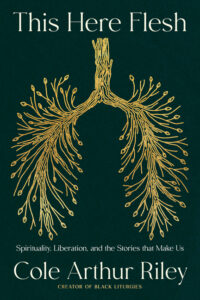 This Here Flesh: Spirituality, Liberation, and the Stories That Make Us Cole Arthur Riley (Convergent) $26.00 OUR SALE PRICE = $20.80
This Here Flesh: Spirituality, Liberation, and the Stories That Make Us Cole Arthur Riley (Convergent) $26.00 OUR SALE PRICE = $20.80
This, like others on this new list, almost ended up on that first post of my favorite 15 of 2022. How could it not? Cole Riley is a friend, a young woman I admire very much. She and her husband (another dear pal) grew up in Western Pennsylvania — her years in Pittsburgh figure into this memoir quite vividly and we love books set in our old town. She is a woman of deep faith, a thoughtful writer, an honest and I might say courageous person. She is following her heart — tattered as it may be in some ways — and putting it out there, as they say. She is honest, and this candid story illustrates her grace, her forthright truth-telling, and her move into a more capacious sort of faith experience than perhaps she lived with previously. This Here Flesh is a book by a strong black woman about her family, about the power of stories, about justice and change and pain and hope. It is a book many have adored.
I say often about books by good friends that it is hard to be objective, as they say. That is, knowing the author, I can hear her voice, almost literally. I pick up on some cues and hints, assuming that I might know the place or people she is alluding to. Anyway, what’s not to like when a friend has a New York Times bestseller on her hands? (Oh, how Beth and I smiled when we saw a Facebook picture of Cole and Billy in New York looking at the book’s name as a sparkling sign on a Times Square marquee.) So, given our closeness to the book, might I really say it is that good? Honestly?
Yes. Yes I do. The advance praise has been astounding (maybe I dreamt it, but I thought I had heard there was some talk of her connecting with Oprah, whose own magazine touted it, no common feat.) The blurbs on the back are mighty, from evangelical writer and hip-hop wordsmith Amena Brown to mystic interviewer Krista Tippett to the remarkable storyteller Kate Bowler (who calls it “beautiful” and “soul-stirring”) to the amazing Southern, black memoirist Dante Stewart, whose Shoutin’ in the Fire also gleaned near-universal applause. Stewart says it is “rigorous, joyous, complex, and honest, and tells the story of how we get free.”
This deserves to be on the Best Books of 2022 list, a memoir by a rising star (she’s the curator of the Black Liturgist instagram sensation.) I have read this twice. I eagerly commend it to you, hoping you, too, will gain a creatively written glimpse not only of a woman’s life — going back in time, and looking forward — but hints and hopes of a beloved community, a space of grace.
This book is an invitation into the delicate weavings of family, inheritance, and pain, how they mark a bloodline and connect a people. Cole Arthur Riley writes with grace and gravity. And somehow she teaches us to think of ourselves as deserving of such grace along the way. This is the kind of book that makes you different when you’re done. — Ashley C. Ford, New York Times bestselling author of Somebody’s Daughter
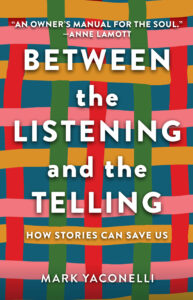 Between the Listening and the Telling: How Stories Can Save Us Mark Yaconelli (Broadleaf Books) $24.99 OUR SALE PRICE = $19.99
Between the Listening and the Telling: How Stories Can Save Us Mark Yaconelli (Broadleaf Books) $24.99 OUR SALE PRICE = $19.99
Well, if the very first one I list is mostly a creative nonfiction foray into memoir, I suppose this argument for the importance of story needs to be listed next. I adored this book, loved it, and found it more moving and entertaining than I even expected. Mark is a good writer, honest and sober, candid about things that matter. I would read anything he does, I suspect, and this was a winner. We are happy to award it a Best Book of 2022.
For the record — not unlike that famous line from Dostoevsky about beauty saving the world — I can live with the phrase if I take it as a somewhat writerly hyperbole. I’m still among those who say that Jesus is the only savior. Still, if Yaconelli is in league with Dostoevsky’s romantic overstatement, that’s not too bad, actually. As he tells it, it sure seems he is mostly right. Stories matter, they can bring healing and hope, renewal and something better than clarity. I get it. This book is a beautiful example of just how holy this can be.
And the book is simply amazing. Anne Lamott says it is an “owner’s manual for the soul.” Progressive preacher John Pavlovitz (author of, If God Is Love, Don’t Be a Jerk) says, nicely:
For a world so afflicted with isolation and disconnection, this beautiful book is medicinal. Yaconelli reminds us how we find our way home.
Indeed, this is a book about finding our way home. In fact, some of it is about Mark’s own upbringing and longing for home, sharing candidly some hard stuff with his famous evangelical dad, Mike. (For those of us who grew up following Mike’s good work and wild antics at YS or reading the Lampoon-esque Wittenberg Door, this is hard, unpleasant revelations.) As Mark unfolds his own story, we come to learn a bit about his move from youth worker to Christian contemplative to, now, this work as storytelling trainer and gatherer and how it became so life-giving for him and those around him. It is, as one reviewer put it, “an immersive, elegant meditation.”
There are stories here about storytelling, about the magic of storytelling events, of the hard and buoyant places where “facades fall and suffering and joy are metabolized.” It is really well written, the stories told with economy and grace. He makes good points and ushers us into a broad vision of a good life.
There are a few major stories set aside as interluded. One about his spiritual director and friend Morton Kelsey is — I kid you not — worth the entire price of the book. Those few pages are simply astonishing, a story of loss and God and goodness and, well, it’s amazing.
His work now is doing this as storycatcher and movement activist. He goes to war zones, works with immigrants at the border, helps those in need of retreat to find ways to integrate storytelling into their work or ministry. It is more than a handbook and you will come away feeling somehow uplifted, more compassionate. It’s a great read.
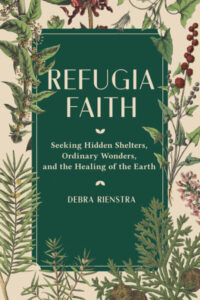 Refugia Faith: Seeking Hidden Shelters, Ordinary Wonders, and the Healing of the Earth Debra Rienstra (Fortress Press) $23.99 OUR SALE PRICE = $19.19
Refugia Faith: Seeking Hidden Shelters, Ordinary Wonders, and the Healing of the Earth Debra Rienstra (Fortress Press) $23.99 OUR SALE PRICE = $19.19
I raved about this in our earlier BookNotes review, suggesting it was both beautifully written and ethically urgent. Rienstra is a great writer, a literature professor at Calvin University (I’ll admit, I’m partial to folks there) who knows a whole, whole, lot about climate change and deep ecological stress, Biblical creation-care, and deeply Christian insights about the natural world. Refugia Faith is a marvelously made book and a true treasure.
We were not alone in sharing how great this book is. Good folks from indigenous theologian Randy Woodley to activist Bill McKibben to leaders in the Evangelical Environmental Network all agree. This extraordinary book’s invitation to become “a healer of a damaged Earth” is inspired.
As her colleague Kristin Kobes Du Mez (of Jesus and John Wayne) put it:
Filled with beauty, wisdom, and a vision for how things might be, this book itself saves as a refuge for the weary, discouraged, and disheartened. Imaginatively conceived and gorgeously written, it is a work of profound insight and deep goodness.
Refugia Faith is absolutely one of the best books of recent years, richly enjoyable prose bringing serious, compelling truth and a fresh way forward.
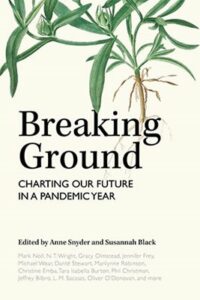 Breaking Ground: Charting Our Future in a Pandemic Year edited by Anne Snyder & Susannah Black (Plough Publishing) $35.00 OUR SALE PRICE = $28.00
Breaking Ground: Charting Our Future in a Pandemic Year edited by Anne Snyder & Susannah Black (Plough Publishing) $35.00 OUR SALE PRICE = $28.00
This came out early in the year and as soon as I saw it I knew it would be a book we’d cherish for a very long time. There’s so much in it, and it is so mature and rich, I knew it wouldn’t be stormed through quickly. I tried to celebrate it at BookNotes and, now, I am even more glad for its presence in the literary landscape. I hope you consider it — certainly a deserving Best Book of 2022 award. Here’s some of what I said at BookNotes:
Every season or so a book comes out that is just so very special, brilliantly conceived, handsomely made, beautifully written, wisely argued, offering solace and joy, guidance and provocation, that as booksellers, we just want to celebrate its presence in the publishing world, want to press it into the hands of nearly every thoughtful reader, and certainly want to write more about it than I should here at BookNotes. Breaking Ground is just such a book. It is an extraordinary volume, one you will keep and cherish for a lifetime.
Breaking Ground can be explained in several ways, from several angles, but I’ll say this much: Anne Snyder and Susannah Black are two very different Christian women who individually edit our two favorite journals, magazines of class and intelligence, faith and vision, publications that we admire and support. Snyder is the editor of Comment (our friends Jamie Smith and Gideon Strauss were her predecessors, and I’ll admit I was honored that they allowed me to contribute to their magazine that was, in certain ways, in the lineage of Abraham Kuyper’s neo-Calvinist movement which we have written about in previous BookNotes.) She has worked at think-tanks and in journalism, is a graduate of Wheaton College and is married to the well-known pundit and public intellectual David Brooks. Comment is an artful, remarkable thought journal about rebuilding our crumbling social architecture and publishes some of the best writers about public life from within what we might call a broad and generous orthodoxy. They have published Smith, Seerveld, Mouw, of course, but also David Brooks and Mark Noll and N. T. Wright and Marilynne Robinson. And they just keep getting classier.
Susannah Black is also a remarkably gifted editor for another magazine, perhaps our favorite these days, Plough. From a different (more ecumenical and even interfaith) literary tradition and somewhat more unique perspective — it emerges from the Jesus-following, Anabaptist folks who live in intentional, shared community in places called The Bruderhof; Plough, like Comment, offers exceptionally high-quality nonfiction writing about society, culture, faith, and values, enhanced by great photography and artwork. While Comment has roots in the Dutch Reformed community and Plough is grounded in the simple way of the Bruderhof, both have a knack for offering profoundly Christian insight into the issues of the day without being preachy. They include classic poetry and fine essays and astute social commentary (with Comment sometimes tending a bit socially conservative and Plough titling a bit leftward, sometimes, or so it may seem.) Each are exquisitely designed, illustrated with full color art.
When the pandemic got serious nearly three years ago, Snyder and her team at Comment (and their sister-in-arms Canadian think tank, Cardus) deepened their work which was already in progress about strengthening civic bonds, healing the fraying social fabric, explore the way the spirit of the age has deformed mediating structures and institutions. I do not recall if they ran pieces by Yuval Levin, but they might have. This project grew to become an online collaboration between Comment and Plough and enlisted all sorts of supportive organizations; Breaking Ground: Charting Our Future… grew out of these remarkable networks such as the Center for Public Justice, the (&) Campaign, The Institute for Human Ecology at the Catholic University of America. It isn’t every day we see The Davenant Institute collaborating with The Awakening Project, and it is lovely to see The Trinity Forum listed next to Mosaic and Bitter Sweet. Kudos to educational organizations like the CCCU and Regent College and Fuller Theological Seminary and to policy think tanks like Initiative on Faith and Public Life for their role. That this beautiful book of essays and articles is a collaboration is an understatement. It is one of a kind.
This kind of collaboration, they tell us, is “an expression of unity amidst plurality and respectful engagement in the context of diverse perspectives.” A lot of good stuff came out of that “web commons” and this book is the result of that “real time” writing offering insight about what we might do as we move forward past the worst years of the pandemic. Those who care about the common good and who long for fresh insights and daring but doable proposals, will find this book a major resource.
Here is what is on the back of the book to explain the genesis of the Breaking Ground project and eventual book:
A public health and economic crisis provoked by Covid-19. A social crisis cracked open by the filmed murder of George Floyd. A leadership crisis laid bare as the gravity of a global pandemic met a country suffocating in political polarization and idolatry. In the spring of 2020, Comment magazine created a publishing project to tap the resources of a Christian humanist tradition to respond collaboratively and imaginatively to these crises. Plough soon joined in the venture. So did seventeen other institutions. The web commons that resulted – Breaking Ground – became a one-of-a-kind space to probe society’s assumptions, interrogate our own hearts, and imagine what a better future might require. This volume, written in real time during a year that revealed the depths of our society’s fissures, provides a wealth of reflections and proposals on what should come after. It is an anthology of different lenses of faith seeking to understand how best we can serve the broader society and renew our civilization.
The authors contributing serious content to this nicely crafted thick hardback (of just over 450 pages) include Mark Noll, N.T. Wright, Grace Olmstead, Jennifer Frey, Michael Wear, Dante Stewart, Marilynne Robinson, Tara Isabella Burton, Phil Chrisman, Jeffrey Bilbro, L. M. Sacasa, Oliver O’Donovan, Jake Meador, Cheri Harder, Amy Julia Becker, Jonathan Haidt, Gregory Thompson, Duke Kwon, Luke Bretherton, Doug Sikkema, Shadi Hamid, and more. You really show own this collection of original pieces by these great writers. They are a remarkable and astute group and this volume — arranged in four seasons — is a gift to behold.
Breaking Ground is surely one of the most important and beautiful books of 2022, a book to cherish. Thank you to all involved. Almost a year later I am still convinced of its lasting value, and want to honor it the best we can. Kudos.
 Agents of Flourishing: Pursuing Shalom in Every Corner of Society Amy L. Sherman (IVP/Made to Flourish) $26.00 OUR SALE PRICE = $20.80
Agents of Flourishing: Pursuing Shalom in Every Corner of Society Amy L. Sherman (IVP/Made to Flourish) $26.00 OUR SALE PRICE = $20.80
If you are drawn to the collaborative vision of Comment and Plough (above), wanting to enlist the most talented, balanced, caring folks to envision a better future, drawing on distinctively Christian practices for the common good, and joining them in ways that non-religious folks might value; that is, if you want to make a difference in the big picture of our needy world without any of the right-wing hoopla of the conquering dominionists, then you may want a serious, careful, studious but upbeat resource offering the Biblical basis for and the spiritual guidance to accomplish just that. Can we really be transforming agents that create goodness and beauty, “pursuing shalom” as “agents of flourishing” as this author puts it?
There is simply no better book to explore these things in this way. I admire Amy very much and commend her work at the Sagamore Institute’s Center on Faith in Communities “which trains and consults with faith-based social service providers and religious congregations desiring to invest more effectively in their neighborhoods.”
She has a PhD (in international economic development ) from the University of Virginia. I’m sure you recall us often mentioning her stand-out Kingdom Calling: Vocational Stewardship for the Common Good. She also, I might add, did what may be the best chapter in the book I edited, Serious Dreams: Bold Ideas for the Rest of Your Life.
Although I’m inclined to say a lot about this amazing book — almost 350 pages if you count pages of endnotes — perhaps the back cover is helpful to show why we care so much about it. And a bit from the publisher:
God calls Christians to participate in his redemptive mission in every sphere of life. Every corner, every square inch of society can flourish as God intends, and Christians of any vocation can become agents of that flourishing.
Amy Sherman offers a multifaceted, biblically grounded framework for enacting God’s call to seek the shalom of our communities in six arenas of civilizational life (The Good, The True, The Beautiful, The Just, The Prosperous, and The Sustainable). Because we believe in what is good and true, we strengthen social ethics and contribute to human knowledge and learning. Because we value beauty, we invest in creative arts. Because we are committed to a just society, we work toward restorative justice and a well-ordered civic life. And our desire to see society prosper sustainably means that our business practices seek the economic good of the community while protecting the physical health of our environment.
This comprehensive volume showcases historical and contemporary models of faithful and transformational cultural engagement, with case studies of all kinds of churches advancing human flourishing. It provides a roadmap for leaders wanting to participate in Christ’s mission of holistic renewal. Discover how being God’s agents of flourishing can change our communities for the better and offer a winsome witness to a watching world.
I’m not alone in insisting this book is truly great and very important.
Agents of Flourishing is a timely book loaded with expert guidance and amazingly practical insights for local churches (agents of God’s inbreaking kingdom) seeking the flourishing of their communities. It presents captivating examples of local churches’ engagement with six community endowments–the good (ethics), the true (knowledge), the beautiful (creativity), the just and well-ordered (political), the prosperous (economic), and the sustainable (natural environment)–as congregants carry out their priestly work of restoring shalom: rightness of relationships with God, self, others, and creation. –JoAnn Flett, executive director of the Center for Faithful Business at Seattle Pacific University
In an age of political division and a shrinking Western church, Amy Sherman gives pastors, scholars, and students a comprehensive vision for equipping the saints to work toward the healing of our cities. Sherman bridges the gap from Scripture to praxis and gives readers both theological frameworks and practical examples of how our work and churches once again show our culture what the gospel looks like in the ordinary, everyday movements in our lives. I highly recommend Agents of Flourishing for anyone longing to see a reintegration of faith and work, private and public, church and city. –Jeff Haanen, founder and CEO of the Denver Institute for Faith & Work
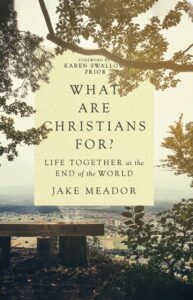 What Are Christians For? Life Together at the End of the World Jake Meador (IVP) $22.00 OUR SALE PRICE = $17.60
What Are Christians For? Life Together at the End of the World Jake Meador (IVP) $22.00 OUR SALE PRICE = $17.60
We highlighted this when it first came out, celebrating Jake’s follow up to his excellent 2020 release In Search of the Common Good: Fidelity in a Fractured World. Like that one, this is exquisitely written, combining stories and examples with fairly profound thinking. To say he’s a combination of Wendell Berry and Jamie Smith with a dash of Timothy Keller wouldn’t be too off base.
In this volume the editor of Mere Orthodoxy brings together the extraordinary thinking of black scholar Willie James Jennings, putting him into figurative conversation with the old Dutch theologian Herman Bavinck. Meador, too, not unlike Amy Sherman (above) explores a “thick conception of the natural order” as a life-giving way to see goodness, beauty and truth.
His call to a more profound sort of Christian politics, a social ethic that seems radically different than the fundamentalist right or the liberal left, is mind-stretching. For some it will be mind-blowing as he makes a seriously Biblical, deeply faithful critique of racism and capitalism and ends up with a profoundly pro-life witness
You’ll have to read this amazing book to see what Meador means by it all and see how he calls us to “renounce the metallic fantasies that have poisoned common life in American life for too long.” For what it is worth, he worries that our Western assumption is to bend the natural world (and all of life) to its own political and economic ends. This is sort of a radical application of some natural law theory and I think it is something we really need to consider, ponder, grapple with.
Alastair Roberts at the Theopolis Institute call it “provocative and unsettling” as a critique of modernity. And yet, it is hopeful, good, gracious. I very highly recommend this book.
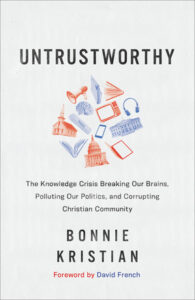 Untrustworthy: The Knowledge Crisis Breaking Our Brains, Polluting Our Politics, and Corrupting Christian Community Bonnie Kristian (Brazos Press) $24.99 OUR SALE PRICE = $19.99
Untrustworthy: The Knowledge Crisis Breaking Our Brains, Polluting Our Politics, and Corrupting Christian Community Bonnie Kristian (Brazos Press) $24.99 OUR SALE PRICE = $19.99
When I announced this earlier at BookNotes, almost as vigorously as I could, I said I would come back to revisit it. I have pondered it for months and my instinct that this is a very important book has not left me. I adored Kristian’s previous book — a guide to all manner of different sorts of Christians and their practices and insights — and was sure this would be wise and fun.
Well, it isn’t that fun. But it is beyond wise, it is nearly brilliant. It is one of the Best Books of 2022. And if not enough people buy it, I’ll name it as one of the best books of next year, too. It’s that important.
There are three things I loved about Untrustworthy. Firstly, it isn’t that academic or dense. There are books about fake news and our propensity to believe weird stuff, and why these days are prone to conspiracy theories and whatnot and some are very dense. This explores this complex topic with astute insight but it isn’t a drag or more than you need to know. It is serious and meaty without being needlessly deep.
Secondly, akin to the first, Untrustworthy is very readable. At times I smiled knowing just what a fine writer she is and how good the prose was. There are stories. Maybe it was a fun and enjoyable read after all, come to think of it. It is sober and serious and although she doesn’t overstate the concerns, I’m convinced that this is one of the most urgent topics of our times. This one will not be the last book we read on this complex and pressing matter, but it should be the first.
Thirdly, if this “knowledge crisis” is “breaking our brains” (and “polluting our politics”) what do we do? Here, again, Ms. Kristian is a mere Christian (I’m alluding to Lewis), standing firmly in the classic ground of Christians from all times and places. That is, she is not overly eccentric, not an oddball not fanatic, but a reliable theological voice. She offers deeply Christian ideas about wholesome practices, from enhancing the Christian mind to being an agent of civility, from forming communities that care about cultural discernment to becoming people who, in graciousness, know how to stand for truth.
Many of us know that all media outlets are biased — it’s just the way we limited, believing, humans work, objectivity being a myth, after all. But fewer of us know how the massive amount of information we have may be verging on propaganda, and what to do about that. How can we be a more responsible consumer of the news? Who can we trust? How can we combat misinformation and lessen its impact on the people I love (not to mention our neighbors and culture at large.)
There are forces that contribute to this crisis. Overcoming the current polarization is going to demand we think harder and work more conscientiously on trust, truth, knowledge. This book is one of the very best — indeed the only book like it. Highly recommended.
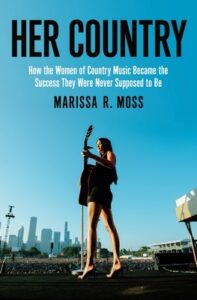 Her Country: How the Women of Country Music Became the Success They Were Never Supposed to Be Marissa R. Moss (Holt) $28.99 OUR SALE PRICE = $23.19
Her Country: How the Women of Country Music Became the Success They Were Never Supposed to Be Marissa R. Moss (Holt) $28.99 OUR SALE PRICE = $23.19
I happily read a number of pop culture books, several each year, and this stood out, head and shoulders, above any others — and I don’t even pay that much close attention to country music. I know little about Nashville, even though Beth and I adored the TV show, Nashville.
This book grabbed me even more than Sarah Smarsh’s populist study She Come by It Natural: Dolly Parton and the Women Who Lived Her Songs that I raved about last year. It is so well written, upbeat, lively, with edge-of-your-seat gossip and drama. And some very touching, earnest, even, look at a few key women in country, alt-country, roots and new folk. As Brandi Carlile notes in her great blurb, Moss introduces us to “the modern-day pioneers, the rebels, the risk-takers, the marginalized, and the misfits.”
I did know quite know about the “startling inequities” in the country music industry. Despite a few famous ladies — from Loretta Lynn to Dolly to Reba — record for record, dollar for dollar, women in country women have been woefully ignored and often overtly mistreated.
Here’s part of the thing as Moss explains it (and man, it leads to some amazing drama): in country music so very much has to do with radio airplay. Unlike other forms of popular music (from soul to rock to hip-hop) Nashville radio DJs and the network of country music radio leaders, call the shots. If one doesn’t get airplay, records aren’t known, and albums don’t sell. This is true for men and women, but, uniquely, an even harder hurdle to get over if one is a woman.
In this sense, Her Country, shows what in older days they called the payola scandal. Except for women, you can imagine the sexual favors that may be demanded by country radio executives. It has been an uphill battle, and this book bravely details artist after artist, songwriters and performers.
The Dixie Chicks, now The Chicks, famously spoke out against then-President Bush’s ill-begotten war in the Middle East. The backlash was fast and furious and put a chill among song-writers wanting to address anything political. Women writers and players were especially marginalized. This is a shocking story almost on par with the McCarthy red-baiting and Hollywood blacklisting of decades before as right-wing talk radio and country music stations mocked women who dared to speak out at all.
Even those who stuck to typical country themes — including some who were Christian and/or gospel — were not given their fair shake. There is even computer soft-ware that country radio stations use to make sure two songs by women singers were not played back-to-back. To circumvent the “good ‘ol boys” power of Music Row was nearly impossible.
Her Country circles back and forth around the lives and history of a few key players — Kacey Musgraves, Maren Morris, and Mickey Guyton, especially. That these talented writers and players couldn’t get their work heard was remarkable. That they spoke about LGTBQ equality and that Mickey is black didn’t help their mainstream popularity. (That these women paid incredible dues on the roadhouse circuits in their home state of Texas is itself a story.) The advocacy for a more diverse sort of singer in the country music scene is a fight worth knowing about.
Recently, in the very moving TV show of the Kennedy Center Honor Awards, one of the honored artists was Amy Grant. One of the groups singing one of her songs was the Highwomen, a bit of a supergroup modeled after the Highwaymen. The struggles and joys of this band coming together is part of Her Country as well (not to mention their legendary work getting more women on the stage at the Newport Folk Festival.) To see Brandi Carlile, Natalie Hemby, Maren Morris, and Amanda Shires (all who I had just read so much about) honoring Amy was a blessing. And to think I had just been reading about them a week before.
Some of the country history here, stuff about the Opry and songwriter circles and talent agencies and white privilege and studio musicians and so on is a blast. Her long playlist is worth the price of the book, including solid tunes from everyone from Patsy Cline to Shania Twain, from Jeannie C. Riley to Faith Hill. From Tammy Wynette to Carrie Underwood. Of the dozens and dozens of songs there are many I never heard of and some are, Moss insists, very important. She’s an unapologetic LeAnn Rimes fan, and highlights singers as diverse as Mindy Smith and Margo Price and the great Rhiannon Giddens. It was a blast from my past recalling Jessi Colter and the wonderful Patty Griffin. (If only she had mentioned Nanci Griffith.)
Marissa Moss even has a few men in her list — guys whose good work comes up in the book since the playlist folders her almost 300 pages; alongside the Pistol Annies there is Jason ispell, Sturgill Simpson, and even Tim McGraw (“Last Turn Home.”) The remarkable playlist just illustrates how deeply researched this is, how this New York author knows the genre, and just how much there is to gain when women — straight, gay, of any race — are given a fair artistic shot. Politics and cash, religion and culture wars are the larger backdrop and these women wouldn’t allow the shift to a brash and macho national ethos constrain them. It is an amazing story.
Her Country shines a light in the dark corners we don’t talk about; it’s equal parts unbelievable and completely believable. These realities are used brilliantly in this book as a tool to illustrate how women are breaking the mold, changing the rules, blurring the lines of genre, and how strong, resilient, inventive, and inclusive these women are. –Holly Laessig and Jess Wolfe of Lucius
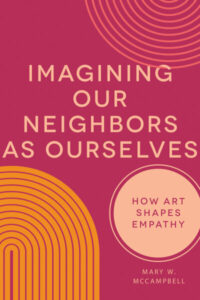 Imagining Our Neighbors as Ourselves: How Art Shapes Empathy Mary W. McCampbell (Fortress) $28.00 OUR SALE PRICE = $22.40
Imagining Our Neighbors as Ourselves: How Art Shapes Empathy Mary W. McCampbell (Fortress) $28.00 OUR SALE PRICE = $22.40
Thinking about our favorite books and favorite moments in bookselling this past year, I am deeply touched with gratitude to recall how we got to help host an online launch party for this book. Along with former Calvin College pop culture curator (and very good friend) Ken Heffner, we kicked off a day of live Facebook presentations about how “narrative can make us better neighbors.” Imagining Our Neighbors shows us how and that good day reminds me of just how good a book this is.
I reviewed this, then, at BookNotes and we were pleased to sell a bunch. It is surely one of the great books of 2023 and we enjoyed it immensely. As Karen Swallow Prior notes, it will “instruct and delight any reader who cares even a little about art, imagination, and humanity.”
With rave reviews from the artful likes of Makoto Fujimura and Jessica Wooten Wilson, this book has been much discussed and I am not alone holding ups its vision of empathy gleaned through stories. As our longer BookNotes review explained, she looks at all sorts of narrative work, from TV shows to novels, from films to record albums. Her tastes are wide and her insight profound. Professor McCampbell invites us to enter into a deeper care for the world by hearing well the stories of artists, religious or not (usually not, at least not overtly so) who bear God’s image and offer insights into the world as it is — and perhaps offer visions of how it might be. This is one of the great books of 2022.
McCampbell takes the ingredients of the familiar and invites us on a theological and experiential journey to self and neighbor compassion. In her book, both storytelling and story analysis, from film to Holy Scripture, inspire and equip us to grow what seems so lacking today: empathy. — Christina Edmondson, psychologist, cohost of the Truth’s Table podcast, and author of Faithful Antiracism: Moving Past Talk to Systemic Change
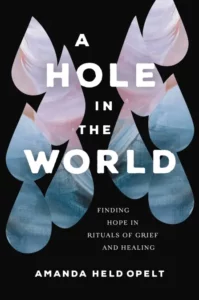 A Hole in the World: Finding Hope in Rituals of Grief and Healing Amanda Held Opelt (Worthy) $27.00 OUR SALE PRICE = $21.60
A Hole in the World: Finding Hope in Rituals of Grief and Healing Amanda Held Opelt (Worthy) $27.00 OUR SALE PRICE = $21.60
I’ve mentioned this more than once at BookNotes and I can’t shake how interesting it is, a grief book unlike any I’ve ever read. It is surely one of my favorite books of 2022.
Here is what I wrote back in at the end of the summer:
This came out a bit ago and I’ve mentioned it before but I just have to announce it again. It is, quite simply, a beautiful walk through 12 different grief practices. Amanda is the bereaved sister of the late Rachel Held Evans so it starts with her coping with that sudden loss. She writes well, includes some humor, and the book feels like a clever cross between a memoir of sorrow and an anthropologist’s survey of what might seem like oddball practices to the uninitiated.
There is so much here – it’s a great read. From fairly common habits (sending cards) to the nearly superstitious (covering mirrors) to the nearly amusing (see “funeral games” – who knew?) to the beautiful (like coping with fear through “telling the bees”), there is something here for everyone. Join Amanda as she sits shiva or as she takes in the beauty of funeral food. You will laugh, I bet, and you may cry. It’s a great book.
The fine writer Jen Pollock Michel says it “invites us to put our aching bodies in motion, to glimpse at the surviving we can all do.” Other fine raves on the back are from Sarah Bessey, Jeff Chu, Michael Card, and K.J. Ramsey, all authors we’ve commended here. Trust us – A Hole in the World is well worth having. I think it is one of the most interesting books I’ve encountered this past year and I am sure we’ll be recommending it for years to come.
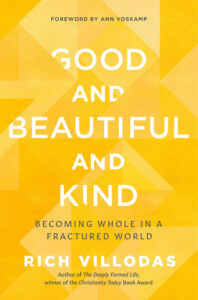 Good and Beautiful and Kind: Becoming Whole in a Fractured World Rich Villodas (Waterbrook) $24.00 OUR SALE PRICE = $19.20
Good and Beautiful and Kind: Becoming Whole in a Fractured World Rich Villodas (Waterbrook) $24.00 OUR SALE PRICE = $19.20
As I’m sure you appreciate, we recommend a real diversity of books here at Hearts & Minds. And our shop is even more complicated than our somewhat curated BookNotes. We really do appreciate so very much and are glad for books to read, good books, joys and challenges.
When it comes to recommending titles, we’re trusting and eager — not too many of our customers are offended by this or that, even if it isn’t for them. We know some read a bit out of their conventions sometimes, just to grow and learn. I love that. I suspect more conservative evangelicals read more liberal stuff than vice versa, but, in any case, there’s a lot of cool diversity here. We’re grateful.
But then there are those authors that really resonate, that are, in one way or another, nearly soul mates, or close to it. I feel that way about the work of Rich Villodas. I’m not alone as a fanboy, of course, and his first book, A Deeply Formed Life, invited many fairly straight-arrow evangelicals to see that racial prejudice was not merely a trendy justice topic, but a matter of the formation of our souls. Agree or not about his traditional views of Christ and the atonement or his gracious but traditional view of sexual ethics, he was a good man, inviting readers to a deeper life, shaped in the virtues of Christ, from the inside out. He offered monastic values, reminded us of emotional health, showed how our bodies connected with our spirituality, insisted on a multiracial vision and called us to a missional way of being the hands and feet of Jesus in a consumerist world.
And then he wrote the follow up, one of 2022’s best books. I couldn’t put it down and have fond memories of reading it outdoors, late into the evening. Good and Beautiful and Kind nearly blew me away, in part because it was so interesting, built on so much good thinking (illustrated by the amazing footnotes and citations.) Here was a theologically conservative evangelical — a grad of the CM&A’s Nyack College— citing Walter Wink (and our old friend Marva Dawn on Walter Wink), Benedicta Ward, Orthodox fathers, James Cone, Karl Barth, Fleming Rutledge. He knows the work on trauma done by Bessel Van Der Kolk (and cites Curt Thompson.) I loved his drawing on a lesser known book by Barbara Brown Taylor. Man, this dude reads widely and writes so nicely.
Importantly, though, for anyone, but dear to the heart of the urban pastor that he is, he knows black literature. I was deeply moved by his use of Ralph Ellison’s The Invisible Man. And, giving him the title, a poem by Langston Hughes.
This book flows out of his experience with his faith community. They seem to have a healthy thing going on and I’m grateful, given how many churches are either toxic or boring. If his community is being shaped by his words — on being good and beautiful and kind — they are, as are we when we join in through reading this book, becoming whole. Which is to say, we are growing in love. In discipleship. In hope. This is a transformational book, not complicated to read, about 200 pages. Highly recommended — the kind of book nearly any of our buyers should appreciate.
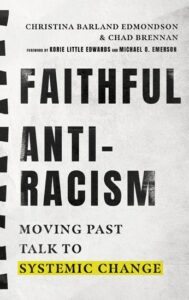 Faithful Anti-Racism: Moving Past Talk to Systemic Change Christina Barland Edmondson & Chad Brennan (IVP) $25.00 OUR SALE PRICE =$20.00
Faithful Anti-Racism: Moving Past Talk to Systemic Change Christina Barland Edmondson & Chad Brennan (IVP) $25.00 OUR SALE PRICE =$20.00
I almost feel like I could give an award to InterVarsity Press for doing the most good books on racial justice, cultural diversity, multi-ethnic ministry and racial reconciliation. In recent years they have been consistent and solid, fresh and wise. There’s been a lot on this topic, from other good publishers too.
It was hard to pick just one that stood out to me, but I am confident this should be on any list of the most important books of 2022. I’ll write another time of other good books in this key aspect of ministry and prophetic work, but for now, I want to honor this extraordinary book. I could go on and on, but will just say three things about what makes it so very useful, stellar, even. It’s a stand-out and should be award-winning.
First, it is unapologetically Biblical and Christina Edmondson and her co-author are excellent on this. (Kristin Kobes Du Mez, who knew Christiana from when she was at Calvin University in Grand Rapids, in fact notes the book’s “sophisticated engagement” with Scripture.) It isn’t a lengthy, arcane treatise, but it is mature and serious in its Biblical orientation.
Secondly, the phrase “faith anti-racists” puts it at loggerheads with both conservative ideologues who decry anti-racism as nothing more than far-left lingo rooted in Marxist CRT and well-intended progressives who just adopt ideological views of anti-racism as if there is nothing to ponder. She is wanting church folk to get beyond talk and good intentions but doesn’t just jump into the anti-racist biz without some theological reflection. Her call to fidelity in our anti-racism work is vital. Naturally, this includes a passion for whole-life discipleship and culturally-astute, systemic changes that are necessary. These authors do not shy away from important, big picture stuff.
Thirdly, this book brings to us the most updated, urgent, illuminating data, research done by the landmark Race, Religion and Justice project (led by Michael Emerson, who wrote a significant foreword.) I said this in a previous BookNotes review but this is, as Duke Kwon puts it, “unparalleled among Christian treatments of the topic.”
There are other reasons I value this — there are excellent discussion questions and eloquent honest prayers. It is nicely made, not too hefty, and really is one of the Best Books of 2022. Kudos to all.
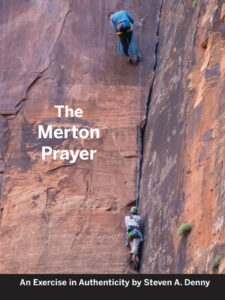 The Merton Prayer: An Exercise in Authenticity Steven A. Denny (ACTA) $19.95 OUR SALE PRICE = $15.96
The Merton Prayer: An Exercise in Authenticity Steven A. Denny (ACTA) $19.95 OUR SALE PRICE = $15.96
Can I name a book as one of my favorites of the year because I am footnoted in it? Ha! Golly, it’s a little thing but although I’ve been thanked and even described in a few books over the years — Rich Mouw gives me a couple of pages in All That God Cares About: Common Grace and Divine Delight, a book I adored, by the way — but I am not sure I’ve ever been actually in a footnote. And there you have it: I was delighted, nonfiction book nerd that I am.
More importantly, this is a book that is unlike any that exists. So many people appreciate and have been deeply touched by the famous Merton prayer (at least part of it) found in Thoughts in Solitude, one of the books I often tell people to read first if they are tackling the famous contemplative. My acquaintance Steven Denny — we met at a conference — had his own life transformed by praying this prayer and asked me if it might help anyone by writing a book about it. I assured him there was, indeed, a need for just such a book. On the big, wide, Merton shelf there’s nobody talking much about it. Yet, it’s so helpful. And so Denny wrote this, his own simply-told story of his own encounter with the famous prayer.
The Merton Prayer is the one that starts, “My Lord, God, I have no idea where I’m going.” You may have heard some of the later lines: “The fact that I think that I am following your will does not mean that I am actually doing so. But I believe that the desire to please you does in fact please you.”
As I’ve described before in BookNotes Denny does a few simple things. To be honest, none are brilliantly literary, not over-the-moon stunning. It is just so earnest, so clear, so sane, so helpful. Step by step, Denny — a former evangelical preacher turned lawyer — walks us through the prayer, line by line. In that, there are worlds of insight and many treasures. It makes this small book on a small press a very significant book. I’ve read it more than once, which is rare for me.
There are three sections that Steve offers for each phrase. First he does some Bible study. Nothing is rocket science here, but he’s a solid preacher and knows his way around the Scriptures. It’s good. Then he exegetes the lines (sometimes even the words) of the prayer. I’m not sure it was necessary to call this exegesis, since that isn’t a word most people use, but we’ll overlook it — he’s an evangelical preacher turned lawyer, remember? The point is he examines the prayer carefully, highlighting a phrase, a bit of grammar, offering reflections on Merton’s own usage. It is amazingly rich, good, solid, stuff, freshly shared. I’ve never seen anybody ruminate on Merton like this, and it is very, very lovely.
The third part in each portion is where we are invited to “turn it, turn it, turn it.” By which he means to ponder, reflect, apply. How do we live this stuff? What difference does it make? How do we inhabit this prayer as our own, knowing what we know now? This is really good stuff and he guides us towards our own deep reflections on the ground words of The Merton Prayer.
There is a fantastic introduction to Merton in the beginning that is really nicely done. There are photographs for those that might appreciate the visual metaphor. All in all, it’s a fine book, made that much more important because it is on a topic that is not often explored — how to use this famous prayer about seeking God’s will when we don’t know where to turn. As he says, “it’s a prayer for you.”
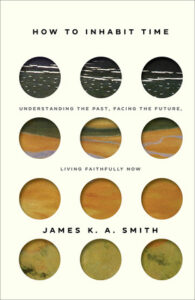 How to Inhabit Time: Understanding the Past, Facing the Future, Living Faithfully Now James K. A. Smith (Brazos Press) $24.99 OUR SALE PRICE = $19.99
How to Inhabit Time: Understanding the Past, Facing the Future, Living Faithfully Now James K. A. Smith (Brazos Press) $24.99 OUR SALE PRICE = $19.99
I have mentioned this book a lot at BookNotes so it will come as no surprise to our friends to see me list it here. It was certainly one of my favorite reads — in part because it pushed and pulled me into new ways of thinking and in part because I just so enjoy this author’s voice. But also, it is important because there is nothing like it that I know of. Nothing I can even compare it to. It deserves an award for that!
There are those who may want to dive into this not because they are drawn to the author but because they are intrigued with the topic and are taken by the themes. Please, please do. I am a big fan of this, dense as some parts are, complex as it may be. Because I trust him so, and value his voice and writing, I hear Smith and smile when he warns/advises in the good, long introduction that citing philosophers (not unlike citing poets and artists) is a chance for the reader to slow down. To ponder and reflect. This is a book which, he says, hopes to draw you more deeply into contemplation. It is, very much, about inhabiting.
As I noted in an earlier review, Smith says,
“…the hope of this book is to occasion an awakening, a dawning awareness of what it means to be the sorts of creatures who dwell in the flux of time’s flow, who swim in the river of history. Knowing when we are can change everything.”
Although it waxes eloquent at times about all manner of obscure goings on and explores in detail stuff like “A History of the Human Heart” and “The Sacred Folds of Kairos” or, as that chapter subtitle puts it, “How (Not) To Be Contemporary” it is at times clear and convicting. Very early on, and then several times later, he asserts:
“Knowing whether it’s dawn or dusk changes how you live in the next moment.”
To wit, he coins an annoying little word he uses throughout, about a debilitating ignorance about not knowing what time it is, or thinking we (and God!) somehow “floats” above it all, not concerned about being in time and in history: nowhen.
This is a book about temporality — which implies an awareness of where we are in history, how we have been generated and how we are to feel about it all; and, he is eager to help us understand the grace of living, appropriately, in a futural manner. The now is pregnant with the future and we live into God’s realm in fresh aways each day. But first, of course, we must reckon with our past. I really resonated with how he used that word, reckoning.
With examples from the tangible, visible arts, to poets and rock singers, with studies from philosophers and social critics, with plenty of Bible and church history How to Inhabit Time is a masterpiece, one of the very best books of 2022. Even if it is at times a bit arcane, a bit dense, a harder work that his most popular few of recent years.
I wonder what reader’s reactions have been to his chapter “Embrace the Ephemeral” (which, happily, starts with a description driving through our local Susquehanna Valley in late October.)
I enjoyed his “Seasons of the Heart” chapter helping us to “inhabit your now.” (Ahh, his bits about the Grand Rapids community garden are very sweet.) His deeper dive into the classic “a time for…” section of Ecclesiastes 3 (cue up Pete Seeger about here, or Cockburn’s version, if you like — it’s not the first Cockburn allusion) is richer than most of the obvious explication in standard commentaries. His call to discern the times cites Gaudete et Exsultate, Pope Francis’s exhortation on holiness in today’s world and he explores how “seasons are transitory yet focal.” All of this is remarkably rich and very thoughtful and, yes — inspiring. From a Fleet Foxes song to a passage lifted from Proust, we come to see how in harder, quieter seasons we can learn much, even as we are attuned to Scripture differently than before. Smith notes that,
“…a life lived with God through time is a period of incubation in which the Spirit of God is creating the capacity within us to hear the same Word anew and to make the Word echo afresh in the new crevices of our heart.”
We are creatures of time. There are, as he notes more than once, vicissitudes. Jamie is a smart guy with a great vocabulary, but he is also a tender guy, sharing about his own depression, drawing out the contours of his homes, celebrating his marriage, a good witness that it is. He is also a philosopher so expect some forays into some deep stuff, but even that is clever and readable. Only Smith calls Huesserl, whom he loves, “a fusty German” and draws on Kierkegaard and Martin Heidegger (a student Kierkegaard) as well as Henri Bergson, “the great turn-of-the-century phenomenologist of time (where Proust was the best man at his wedding!)” Who knew?
Yes, you get some cool lines from the Avett Brothers and he cites the moving memoir of Brandi Carlisle and he goes on, righteously, about BLM and Alice Walker’s food revolutions. But you also hear his calm ruminations on Reinhold Niebuhr and other heavyweight thinkers. (Did you see his piece in the Christian Century about Niebuhr? It was quite good.) From Winn Collier’s lovely recollection of Eugene Peterson’s “aha” moment about becoming “unhurried” (as told in Winn’s biography, A Burning in My Bones) to his citation of a beautiful passage on leisure by Calvin Seerveld, he helps us live into the vicissitudes, and hear the “tempo of the Spirit.” I told you it was interesting.
I name this now as a favorite book of 2022 and one of the best, delighted as I was to be challenged to think more about being an eschatological person (or, better, to be part of a eschatological people.) The notion of longing for “kingdom come” is different, of course, than (as he explains beautifully) counting down the days to a rapture; fixation on the end times, he curiously shows, is, actually, rather a-historical, as we wait for God to wipe the slate clean. His vision of God’s renewal of all things is very, very different — nor nowhen. It is worth having. I hope you order it today.
James K. A. Smith shows us that time is a gift waiting to be redeemed, and a central conviction of this book is that ‘the Lord of the star fields’ is intimately attuned to our haunted, beautiful histories. Dwelling with these lucid, winsome meditations on ‘spiritual timekeeping’ was like listening in on a lively conversation between St. Augustine, Gustavo Gutiérrez, James Baldwin, and Marilynne Robinson, while Pink Floyd’s Dark Side of the Moon played in the background. — Fred Bahnson, author of Soil and Sacrament
James K. A. Smith’s inspired work examines time not as hourglass sand running hopelessly through our fingers but as a divine gift that we can capture just enough to recognize the pearl of life that time shapes. A thoughtful and engaging book. — Sophfronia Scott, author of The Seeker and the Monk: Everyday Conversations with Thomas Merton
 This Contested Land: The Storied Past and Uncertain Future of America’s National Monuments McKenzie Long (University of Minnesota Press) $24.95 OUR SALE PRICE = $19.96
This Contested Land: The Storied Past and Uncertain Future of America’s National Monuments McKenzie Long (University of Minnesota Press) $24.95 OUR SALE PRICE = $19.96
There are some academic publishing houses that make very nice general market books beside their arcane scholarly texts. Books by the University of Minnesota have blessed me nicely over the years with some very nice volumes, and this is certainly one of them. I’m not kidding — it’s a joy to hold, hefty and nice.
It is also funny to think that parts of an early chapter of this were first published in a journal called Nowhere. Which isn’t exactly “nowhen” (see above) but still sounds fishy. But this book is anything but nowhere: it is precisely about specific places and whether you have been to them or not, this author takes you there with vivid prose, solid natural history, good stories, colorful concerns. It’s a great read.
There are interviews galore, informative and captivating history, and stuff about landscape and wildlife and, yes, politics. From the older travesties of the removal of indigenous people to modern debates (from Obama to Trump to Biden) about national moments, this is cutting edge, vital stuff. I am very glad to name it here, celebrating it as a wonderful read, a very good book, and an important contribution to our contemporary discourse.
This Contested Land, you should understand, is about taking a closer look at twelve national moments (which she calls “the scrappy younger siblings of National Parks.”) I have not been to most of these and had not even heard of a few. The first one she visits because President Trump was decreasing its land size by 80-some percent. Of course, he wanted to sell it off for drilling, mineral rights, and other capitalist gains, rejecting the notion from Ulysses Grant on through Roosevelt and most others that we need such public spaces.
The book is arranged with a handful of chapters in each of three sections, Rock, Ripple, and Rift. She takes us from Bears Ears National Monument, Utah, to Katahdin Woods and Waters National Monument in Maine. One is in Hawaii, another in Hanford, Washington. Most, like the fabulous Grand Staircase-Escalante National Monument in Nevada are “out West” as we East Coasters say, like thrilling spots in California, New Mexico.
Author McKenzie Long is a rock climber, graphic designer, and writer who lives in the Sierra Nevada. A former managing editor at OutdoorGearLab.com, she is the coauthor of two climbing guidebooks and author of an award-winning essay, “The Alphabet Effect,” published in Nowhere magazine. Some of our readers will be glad to know that was a writer in residence at Mesa Refuge in Point Reyes, California, where she was named the 2019 Terry Tempest Williams Fellow for Land and Justice.
In This Contested Land, McKenzie Long reframes national monuments in the American consciousness. With painterly language, superb historical research, and engaging boots-on-the-ground storytelling, this book explores crevices for meaning and truth in what for many is a gray area between politics and place. This is a vivid, smart, and overdue book.–Kathryn Aalto, author of Writing Wild: Women Poets, Ramblers, and Mavericks Who Shape How We See the Natural World
With intricately woven stories and stunningly artistic prose, This Contested Land invokes the intense power of relationships between humans and landscapes–a force that not only influences what people think should happen to a specific place but what the future of our Earth itself might become. — Katie Ives, editor-in-chief of Alpinist and author of Imaginary Peaks: The Riesenstein Hoax and Other Mountain Dreams
TO PLACE AN ORDER
PLEASE READ AND THEN CLICK ON THE “ORDER HERE” LINK BELOW.
It is very helpful if you tell us how you prefer us to ship your orders.
The weight and destination of your package varies but you can use this as a quick, general guide:
There are generally two kinds of US Mail options, and, of course, UPS. If necessary, we can do overnight and other expedited methods, too. Just ask.
- United States Postal Service has the option called “Media Mail” which is cheapest but can be slow. For one typical book, usually, it’s about $3.69; 2 lbs would be $4.36.
- United States Postal Service has another option called “Priority Mail” which is $8.50, now, if it fits in a flat rate envelope. Many children’s books and some Bibles are oversized so that might take the next size up which is $9.20. “Priority Mail” gets much more attention than does “Media Mail” and is often just a few days to anywhere in the US.
- UPS Ground is reliable but varies by weight and distance and may take longer than USPS. We’re happy to figure out your options for you once we know what you want.
If you just want to say “cheapest” that is fine. If you are eager and don’t want the slowest method, do say so. It really helps us serve you well so let us know. Just saying “US Mail” isn’t helpful because there are those two methods, one cheaper but slower, one more costly but quicker. Which do you prefer?
– DON’T FORGET TO LET US KNOW WHAT SHIPPING METHOD YOU PREFER –
BookNotes
SPECIAL
DISCOUNT
20% OFF
ALL BOOKS MENTIONED
+++
order here
this takes you to the secure Hearts & Minds order form page
just tell us what you want to order
inquire here
if you have questions or need more information
just ask us what you want to know
Hearts & Minds 234 East Main Street Dallastown PA 17313
read@heartsandmindsbooks.com
717-246-3333
No, COVID is not fully over. Since few are reporting their illnesses anymore, it is tricky to know the reality but the best measurement is to check the water tables to see the amount of virus in the eco-system. It’s still bad, and worsening (again.) With flu and new stuff spreading, many hospitals are overwhelmed. It’s important to be particularly aware of how risks we take might effect the public good. It is complicated for us, so we are still closed for in-store browsing due to our commitment to public health (and the safety of our family, staff, and customers.) The vaccination rate here in York County is sadly lower than average. Our store is a bit cramped without top-notch ventilation so we are trying to be wise. Thanks for understanding.
Please, wherever you are, do your best to be sensitive to those who are most at risk. Many of our friends, neighbors, co-workers, congregants, and family members may need to be protected since more than half of Americans (it seems) have medical reasons to worry about longer hazards from even seemingly mild COVID infections.
We are doing our famous curb-side and back yard customer service and can show any number of items to you if you call us from our back parking lot. It’s sort of fun, actually. We are eager to serve and grateful for your patience as we all work to mitigate the pandemic. We are very happy to help do if you are in the area, do stop by.
Of course, we’re happy to ship books anywhere.
We are here 10:00 – 6:00 EST / Monday – Saturday, closed on Sunday.

